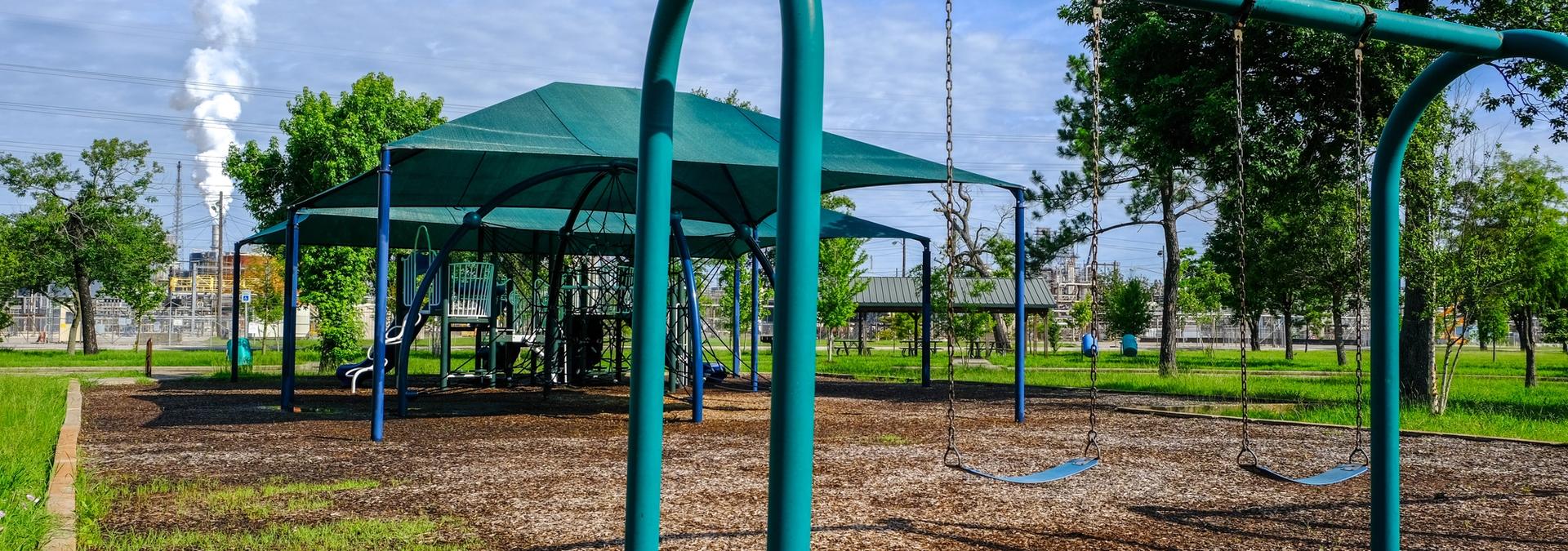
For the good of Texans, it's time to make polluters pay
Corporate polluters in Texas pay only about a penny per pound of illegal air pollution. Photo: Julie Dermansky.
Just beyond the playground at Hartman Park in Manchester loom the aging pipes, soot-streaked smokestacks and towering storage tanks of Valero Energy’s Houston refinery.
During Hurricane Harvey in 2017, the roof of one of those tanks collapsed, sending harmful chemicals like benzene wafting around the homes of mostly Latino families.
In November, Texas officials gathered here to unveil vans newly equipped to monitor air pollution like this in real time during disasters, chemical fires and emergencies. The state’s $2.2 million investment came after advocacy during the last legislative session and recognition that TCEQ, the Texas Commission on Environmental Quality, was ill-equipped and unprepared to provide detailed data about the potential threats from more than 100 reported Harvey-related pollution releases.
“We learned some lessons,” TCEQ Executive Director Toby Baker told the Texas Tribune. “When a hurricane comes in, we take our stationary monitors down because the hurricane winds will damage them or we will lose power to them. What we found after Harvey was meaningful criticism that we didn’t have the ability to fill that gap. So, the Legislature helped us and stepped in.”
With the photo opportunity complete, TCEQ drove the vans back to Austin, hours from the communities that need them most. But as the Legislature reconvenes in January, there are more steps lawmakers, Gov. Greg Abbott and his TCEQ appointees can take to protect Texans’ health and safety.
Every day, dangerous air pollution is illegally released in Texas. In Houston, illegal releases happened on 357 days in 2019, an Environment Texas analysis found. This happens because it can cost corporations less to be caught polluting than continuing to pollute.
Even when they are penalized, they pay about a penny per pound of illegal air pollution.
Texans, meanwhile, are paying the biggest price. Illegal air pollution causes at least 42 early deaths and $241 million in health costs in Texas on average each year, Indiana University researchers estimated, before COVID-19 put people with respiratory illnesses at even greater risk. These burdens fall disproportionately on Black and Latino communities, because they are the most likely to be living where polluters found it cheap to operate — product and proof of discriminatory housing and environmental policies spanning decades.
These communities know how that leads to big problems. In Manchester, where 29 other polluting facilities are located besides Valero’s refinery, the cancer risk is 22% higher than in Houston overall, according to the Union of Concerned Scientists and Texas Environmental Justice Advocacy Services. Children living near the heavily industrial Ship Channel are 56% more likely to develop leukemia than those 10 miles away.
Most Texans are ready for that to change for all Texans. Reducing pollution should be a top health priority for the Legislature, a recent survey found. Smart policies, when enforced, can save lives and protect everyone.
The presumptive Texas House speaker, Rep. Dade Phelan, a Beaumont Republican, understands that. After two explosions at TPC Group’s Port Neches plant forced more than 50,000 people to evacuate before Thanksgiving in 2019, hospitalizing three workers and scattering asbestos-laden debris six miles away, Phelan said the state must hold corporations accountable to the highest standards.
That’s within reach. Phelan and his colleagues must increase funding for more inspections and monitoring to identify facilities that most threaten health and safety. They must make corporate polluters pay mandatory fines for illegal releases that cause harm, and eliminate the commonly used loophole called affirmative defense, which allows polluters to claim their emissions were unavoidable — a kind of “mistakes were made” excuse. They should consider forming a state environmental justice council and examine the cumulative impacts of pollution exposures, health disparities and income inequality to inform decisions about permits, regulations and other major actions.
The vans are a start, but Texas can do better. After a year of days with illegal air pollution, we must.
This article originally appeared in the Austin American-Statesman.
Tresaugue is senior communications manager for Environmental Defense Fund.
STAY UP TO DATE
The quality of our newsletter is considered satisfactory and poses little or no risk.
SUBSCRIBE

